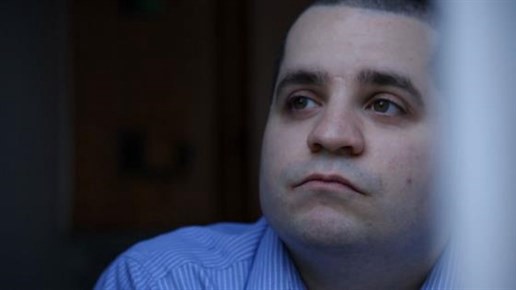Erin Lee Carr is a documentary filmmaker. Before that, she covered the vast intersection between science and technology for Vice Media, specifically for their science vertical Motherboard. She also worked as a producer at The Verge. (Erin Lee Carr)
“Thought Crimes” will premiere at the 2015 Tribeca Film Festival on April 16.
W&H: Please give us your description of the film playing.
ELC: This is a story about the internet and who we pretend to be on the internet. Our subject is NYPD officer Gilberto Valle, who was convicted of conspiring to kidnap, rape, kill, and eat several women. After spending 22 months in a federal prison, a federal judge decided to overturn the conviction of this man and set him free. The case is currently under litigation, but with exclusive access, I spoke with Valle about his dark desires, the trial and if someone can be found guilty of a crime that they only thought about committing.
W&H: What drew you to this story?
ELC: I started looking at the story through Dan Engber’s coverage at Slate and was hooked. It seemed like my worst fear realized. Months and month later, in a meeting with HBO, I sat and discussed the silk road with Sheila Nevins, Sara Bernstein and director/producer Andrew Rossi. We started talking about the internet making our darkest desires real, and instantly I remembered the “Cannibal Cop” story. They told me to try and get access. Against most odds, I was able to make contact with Gil, and I started looking at the story in a real way.
W&H: What was the biggest challenge in making the film?
ELC: I know that documentary filmmakers often cite access as being the chief obstacle, but it really was with this film. Gilberto Valle was in a federal facility after being convicted and already serving time in solitary confinement. I breathed a sigh of relief when I was put on his approved visitor list, but then there was the added issue of getting a camera in, as federal facilities rarely let a camera in.
I started visiting the prison with his mother and father, but was I was asked to leave upon my third time at the prison. I called the Bureau of Prisons to determine the reason, but no one would give me an answer. I thought the story was dead. That was until July 1, 2014, when a federal judge overturned the conviction and set Mr. Valle free. Every outlet under the sun was competing for Valle’s story, but I was able to use my nine months of source work with him to garner the exclusive for HBO and this project.
W&H: What do you want people to think about when they are leaving the theater?
ELC: My goal, like many people’s, is to make the audience think. Why was Gil Valle put in jail when there was so little physical evidence? Did his occupation as a police officer factor into his conviction? Would Gil Valle had done it? What implications does the trial of the “Cannibal Cop” have for the public at large? These are questions I agonized over and worked into the film. I would love to have a dialogue with people about it!
W&H: What advice do you have for other female directors?
ELC: Don’t let people’s criticisms of you factor into the way you think about yourself. This has been talked about, but we need to keep talking about it! My whole life, people have told me I am too loud, aggressive and opinionated. I found a way to channel those personality characteristics into something productive. However, it was really important for me to figure out how to balance having my opinions heard with being an adept listener. Films are collaborative, and you need to listen to find the good stuff.
My other bit of advice is always surround yourself with people smarter than you, male or female. For this project, I was able to work with Andrew Rossi (producer) and Andrew Coffman (editor), who are the most difficult individuals to debate with, but ultimately it made the film that much stronger.
W&H: What’s the biggest misconception about you and your work?
ELC: I have very specific taste when it comes to making films (Internet rights, 3-D printed weapons, space aliens, and the dark web), but I don’t want people to think that these films are only for people who have the same taste. These topics are important for the vast majority, as we all use the web and value those rights.
W&H: How did you get your film funded? Share some insights into how you got the film made.
ELC: “Thought Crimes” was made possible by HBO Documentary Films, specifically Sheila Nevins and Sara Bernstein.
W&H: Name your favorite woman-directed film and why.
ELC: Last night I watched “There’s Something Wrong with Aunt Diane,” directed by Liz Garbus, for the third time. I swear this isn’t an HBO shoutout, but that film has always stayed with me. What happened on that day on the Taconic State Parkway? How could the family exist in that state of denial for so long? What is it about being the “perfect” mom that unravels us as women? I think about it often, and to me that is the mark of a powerful documentary film.







